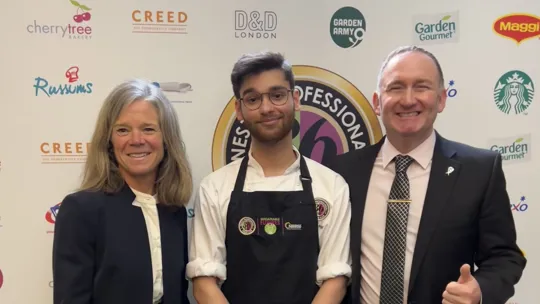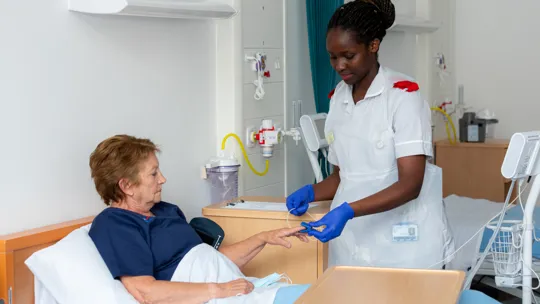June 2023
Refugee Week exhibitions highlight the plight of refugees and 30 years of the Bosnian War
By Carrie Mok
Share post:Read time: approx 1 mins
With just a suitcase worth of belongings between the three of them, Alma Aganovic and her family were flown out of Sarajevo and away from the turbulence and brutality of the Bosnian War.
It was August 1993, and Alma’s 11-year-old brother had been seriously injured by a bomb that exploded just 20 metres away from him, while her father had died in the war just a few months earlier.
Between 1992-1995, Sarajevo was shelled daily with over 100,000 people killed and 2.2 million people forced to flee their homes. At the time it was the largest displacement of people in Europe since the end of the Second World War.
With calls from other nations to do more to help Bosnian citizens, Alma and her family were among the first evacuations of sick children and their families evacuated to the safety of countries such as the UK as part of Operation Irma.
When they arrived, the family stayed in Birmingham Children’s Hospital at first as that was where her brother was being treated. They were then placed in a flat near Hagley Road,
“It was a lovely area. Everyone looked out for each other,” Alma remembers. “People were really friendly and helped us out a lot. We were always told English people were really closed off but I didn't find that at all, I found them to be really friendly.”

Photo: Honour Burgess / Comic Relief
But it was tough trying to get accustomed to a new life, and it wasn’t just the culture as Alma explains, “As I didn’t speak any English at the time, I had to get used to speaking the language all while my brother was staying in hospital. I went to Brasshouse Language Centre which was round the corner from where the hospital used to be, but there were lots of hospital treatments going on. My dad had only died a few months before we came here, so I didn’t even have time to grieve him as all of that was happening at the same time. So, really when you put it all together, it wasn't just the culture shock, there was a lot going on.”
Having fled Bosnia, Alma also left behind all of her belongings, including a set of letters she had been exchanging with her friend Nudžejma in Sarajevo.
“We were originally talking to each other on the phone and then phones stopped working. So for a teenager not to have any friends, that was quite difficult. My mum was still going to work at this time and eventually, by accident, I overheard my mum saying that her friend from work lived on this road, which was the same road as my friend. So I asked her if she would take letters to her from me.”
Alma and Nudžejma continued to write letters to each other even after she was evacuated to the UK at which point Alma asked her to pick up the original letters for her. It would be another two years before trams were working in the city again, and Nudžejma was able to finally retrieve the letters.

Photo: Amir Mahdavi / Comic Relief
In 2001, Alma brought her letters from the UK to Bosnia and finally saw Nudžejma again for the first time in eight years. Together they photocopied all their letters so that each person would have a full set.
Now University College Birmingham’s Director of Marketing and Admissions, Alma will be featuring these letters in two exhibitions as part of Refugee Week to highlight the plight of refugees and their journeys seeking safety.
The first, called People Move, is a project in collaboration with The Daily Mirror, while the second is with Comic Relief called Comic Relief Presents Re-Rooted: Stories of Starting Again. She will also be doing a reading of these letters at the Comic Relief exhibition.
“I just think the story needs to be told. It's really important for me that I leave some kind of a legacy about what happened. I always tell my kids and, you know, I think my daughter was four when she said to me ‘I know that lots of people died in Bosnia, I know that's why you wear this flower, as a symbol of the genocide that took place there.’
“She knew that from a very young age because I really wanted them to know, yes it's very painful for them to know what happened but it’s also to educate other people because if you ask half of the people in any room, they wouldn't know necessarily know about the Bosnian War or what happened, especially with younger generations coming through and this was only 30 years ago.
“When the Holocaust happened in the Second World War, we all said, ‘never again’. But in different parts of the world, this is still happening. It's still horrendous. So, that's why I use pretty much every opportunity to tell people.”
People Move, an exhibition by The Daily Mirror, will be at London’s Living Room, City Hall, Kamal Chunchie Way, London on 19th June. Get your tickets here.
Comic Relief Presents Re-Rooted: Stories of Starting Again will be exhibiting at gallery@Oxo at Oxo Tower Wharf, Barge House St, London, from 21st-25th June between 11am-4pm. Entry is free. Keep an eye on the Comic Relief website for more information on the exhibition from 20th June.
Check out our latest news stories

Student chef Rohan takes runner-up spot in prestigious Toque d'Or competition
Rohan Bragg, a Birmingham College of Food-mentored student working towards his Professional Chef foundation degre…
Read more
Two nursing master's launched for community health and social care
University College Birmingham has launched a new MSc Adult Social Care Nursing, MSc Homeless and Inclusion Health Nursing an…
Read more
Strength of student voice recognised in National Student Survey 2024
University College Birmingham’s commitment to listening to the voices of its students has been recognised in the National…
Read more
New education centre to open thanks to joint university partnership
University Birmingham East is driven by a shared commitment to addressing challenges faced by children growing up facing di…
Read more
University launches government-funded pilot to upskill adult learners
The Introduction to Cyber Security and Introduction to Digital Marketing courses are part of the Modular Acceleration Pro…
Read more
Blog | Can I go through Clearing if I change my mind on my course?
There are many good reasons you might choose to access a course through the Clearing system, so don’t think of it as second…
Read more